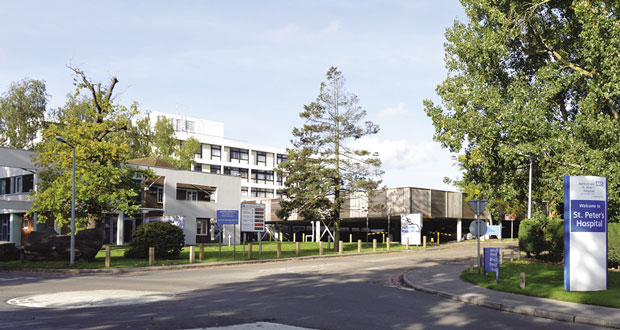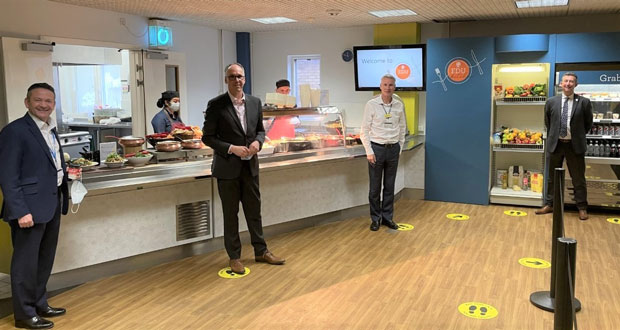CHANGING TIMES
Previously, ASPH engaged an external catering supplier. The model was a straightforward commercial deal, based on a concession fee – a common retail contract arrangement in the NHS. The food was fairly typical of a hospital staff restaurant. In a survey taken in 2018, customers gave the service a 52 per cent satisfaction rate.
During COVID the existing contractor offer became unviable for both ASPH and the supplier. The Trust needed service continuity so it could enact special measures and avoid some of the usual procurement red tape.
Working with Neller Davies, which has been providing food and FM consultancy services since 2017, a strategic plan was developed and endorsed by the Board.
The plan focussed on engaging the hospital workforce (clinical and non-clinical) which ensured collaboration and buy-in from the outset. A consequence of the plan was to insource all retail catering services on 1st October 2020.
 Bell said: “Our previous contractor did exactly what we contracted them to do but the truth is that the contract didn’t provide room for any innovation. Bringing our services in-house enabled us to change quickly.
Bell said: “Our previous contractor did exactly what we contracted them to do but the truth is that the contract didn’t provide room for any innovation. Bringing our services in-house enabled us to change quickly.
“But we knew that we couldn’t change on our own and we did need support. We are not catering experts so we needed advice and help. We wanted to move from a canteen to a restaurant mentality. We wanted to change the mindset and it was a real leap of faith.”
A COLLABORATIVE VISION
A new and ambitious vision was set out to offer catering services for staff that mirrored those in other professional settings.
A distinct set of targets to improve catering standards were developed to further align them with external requirements such as Government Buying Standards, WRAP initiatives and CQUIN guidance (a framework within the NHS that supports improvements in the quality of services). It also aimed to improve food safety ratings from 3 stars to 5 stars, and respond to the NHS Food Review 2020, focussing on food safety and quality.
In the interests of doing things differently, it wanted to achieve similar satisfaction scores to business and industry or ‘corporate’ establishments, which regularly score above 70 per cent.
Julian Fris, Director, Neller Davies, said: “Whilst we knew we were stepping outside of the normal NHS comfort zone, we had complete faith in our approach.
“We have extensive experience of running projects in critical environments, and we went through a traditional governance structure and followed the same process. What was really important was having that goodwill, strong relationships, trust, and ultimately meaningful collaboration.”
The Trust, through Neller Davies, directly engaged BM, a workplace caterer providing services to the corporate sector, to fast-track developments. The objective was to give employees a comparable service to BM’s existing client base of legal firms, media, financial and tech organisations.
Fris said: “We deliberately went to companies who didn’t work in a healthcare space. We wanted fresh eyes on an age-old challenge. Given that workplace catering was effectively closed down at this time, BM had lots of talented people on furlough so it was an opportune moment to try something new.”
However, without the endorsement of senior management at the Trust, this bold move would not have been possible. Fris argues: “It was really important that the Board bought into the process from the very outset. This was all about trust.”
The close working relationship and trust that Fris refers to were evident from an initial £50k investment signed off by the Trust Board for equipment, a makeover of the spaces, training and resources.
Bell added: “Normally, when looking to implement such a transformational project, there are often barriers one has to consider in terms of taking people on the journey. I’ve been pushing at an open door from the outset.”






